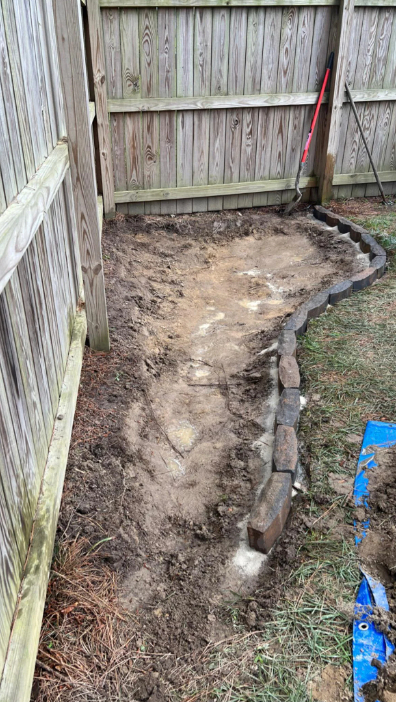A Redditor shared beautiful results after a day of hard work in the yard.
"Worked my tail off today building this native rain garden," they wrote.
In r/NativePlantGardening, the poster said runoff from a neighbor's gutters passed through a corner of their backyard on its way to a nearby creek.

"Today I spent the entire day excavating a gentle bowl shape," they continued, "inserting paving edgers to keep the garden in and the grass out, amending and replacing some of the soil, planting, and mulching. I am so delighted with the way this came out after years of looking at pitiful drowned grass during every wet season."
Aside from mitigating flood risk with the rain garden, the North Carolinian improved their ecosystem by using native plants, naming crossvine, Christmas fern, blue false indigo, river oats, sweet pepperbush, and bee balm. They also planned to sow daisy fleabane and orange coneflower.

Native plants are better suited for their environments and therefore naturally hardy and healthy, having adapted over thousands of years to local weather, water supply, and soil. Some of their roots reach 15 feet deep, helping prevent erosion and flooding.
Other benefits of native species include habitat creation — for pollinators, small animals, and microscopic organisms — and money savings from using less water, fertilizer, and pesticides.
They are particularly better than traditional grass. The American Society of Landscape Architects stated that the Environmental Protection Agency reported it costs $20,000 to maintain an acre of non-native turfgrass over 20 years. An acre of prairie or wetland costs $3,000.
That's why many homeowners are tearing out their turfgrass and turning to wildflower gardens or other alternatives, such as clover and buffalo grass. These rewilding techniques can help reduce temperatures in a warmer world and sustain our food supply, as 70% of plants would be unable to reproduce or provide food without pollinators.
"Looks great, and great choice of plants," one commenter wrote. "… To keep your fence from rotting faster, pull the mulch away by a few inches."
Another said: "Nice nice... work with it instead [of] against it!"
Join our free newsletter for easy tips to save more, waste less, and help yourself while helping the planet.









